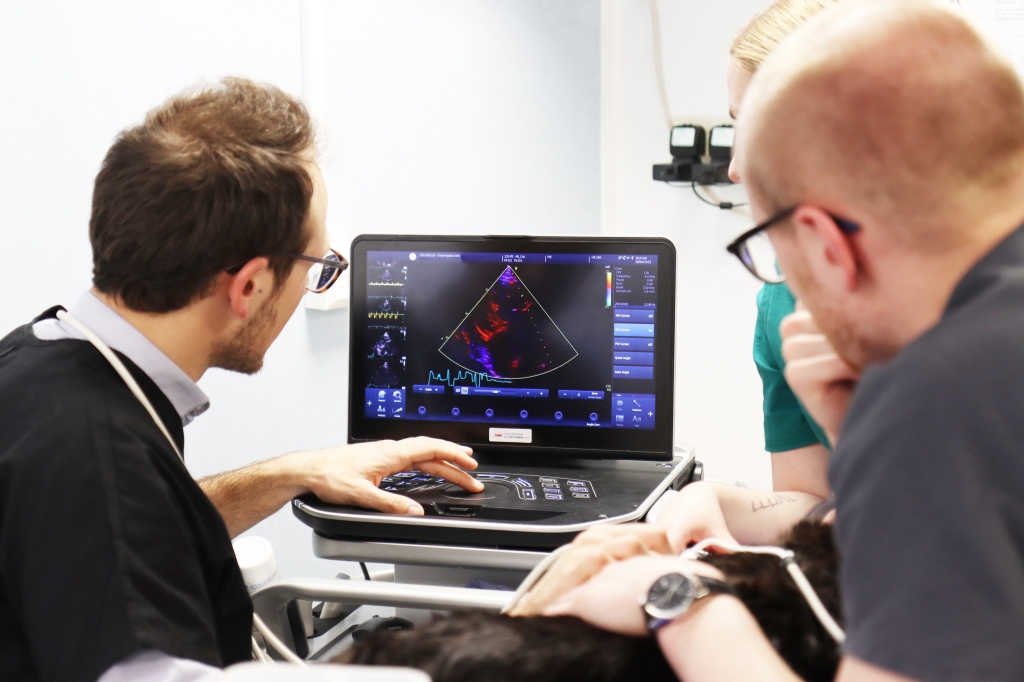
The clinical improvement project is running in 48 of CVS' small animal practices
New CVS Clinical Improvement Project To Improve Cardiac Ultrasound Scan Rates
CVS is running a clinical improvement project in 48 of its small animal practices to improve the use of cardiac ultrasound scans in first opinion heart disease diagnosis and treatment.
Cardiac disease is common in small animals, affecting 10% of dogs and 15% of cats during their lifetime[i]. Smaller dog breeds are most likely to have myxomatous mitral valve disease while larger breeds are more prone to dilated cardiomyopathy[ii]. The most common cardiac condition diagnosed in cats is hypertrophic cardiomyopathy.
Veterinary cardiology diagnosis and treatment has progressed significantly in the last decade. There has been considerable advancement in affordable diagnostic equipment, the staging of certain diseases, drugs and treatments, and case management within first opinion practices.
Echocardiography, the use of ultrasound to examine the heart, is a key tool to diagnose and stage cardiac disease. Work ups using echocardiography can enable the clinician to look both inside and around the heart, to get an idea of how it is functioning in real time.
The CVS clinical improvement project initially looked at how effective CVS small animal first opinion practices were at conducting echocardiography. It found that a key barrier was a lack of up-to-date equipment, along with a lack of current knowledge and training - both in using ultrasound and echocardiography equipment and in interpreting images. As a result, many colleagues were routinely referring suspected cardiac disease cases.
The CVS cardiac ultrasound project leads then reviewed and recommended practice equipment, so that clinicians had the tools to perform echocardiograms in practice. This included the acquisition of echocardiography tables - so that practitioners could scan an animal’s chest from underneath, more advanced cardiac ultrasound machines and electrocardiogram (ECG) machines.
A suite of resources was produced - for practice vets and nurses – to help them to improve echocardiography scan rates and nurse cardiology clinics. These included; clinical guidelines, machine guides and client resources.
To upskill and develop colleagues, dedicated vet and nurse training sessions were held. Three vet training days focused on new advancements in heart disease diagnosis and treatment - including how to perform echocardiography – held by CVS’ cardiologist specialists. Whilst two nurse CPD days taught colleagues how to conduct nurse cardiology clinics to support pet owners, and how to perform and interpret electrocardiography, blood pressure checks and thoracic point of care ultrasound (POCUS).
Learning lunches and webinars were also hosted regularly, and a certificate holder ‘buddy’ system is currently being set up. In addition, a cardiology online workspace has been created on CVS’ Knowledge Hub platform, hosting training materials and a discussion forum - where colleagues can collaborate and share experiences.
Lynsay Morgan, Regional Clinical Lead at CVS who is responsible for the cardiac ultrasound clinical improvement project, said:
“Echocardiography is a powerful diagnostic imaging tool. It can be used to diagnose and stage a wide number of small animal heart diseases.
“This project aims to improve early diagnosis of heart disease, and optimise treatment, and ongoing management.
“We want to empower our first opinion small animal vets to perform more echo evaluations and to work up their cardiology cases to a high standard. We also want our nurses to be involved in patients’ life-long care, and provide ongoing support to owners of pets with heart disease.
“We hope this project will improve case identification, increase skills and confidence, and see optimum diagnosis and management of cardiac disease.”
CVS Group operates across small animal, farm animal, equine, laboratories and crematoria, with over 500 veterinary practices and referral centres in the UK and Australia. In the last five years the company has invested nearly £80 million in its sites, facilities and equipment, in addition to industry leading training and support, to give the best possible care to animals.
[i] Keene, B. W., Atkins, C. E., Bonagura, J. D., Fox, P. R., Häggström, J., Fuentes, V. L., Oyama, M. A., Rush, J. E., Stepien, R., & Uechi, M. (2019). ACVIM consensus guidelines for the diagnosis and treatment of myxomatous mitral valve disease in dogs. Journal of Veterinary Internal Medicine, 33(3), 1127–1140.
[ii] Payne, J. R., Brodbelt, D. C., & Luis Fuentes, V. (2015). Cardiomyopathy prevalence in 780 apparently healthy cats in rehoming centres (the CatScan study). Journal of Veterinary Cardiology: the official journal of the European Society of Veterinary Cardiology, 17 Suppl 1, S244–S257.
More from CVS UK Ltd
- Finn Pathologists introduces AI-Assisted Ki-67 prognostic scoring for canine mast cell tumours
- CVS introduces first UK Equine Nursing Committee to help support clinical decision-making
- Largest ever study on veterinary workplace injuries finds some harms seen as ‘everyday norms’
- Caledonia Farm Vets practice to open in Strichen Aberdeenshire
- CVS Group reduces medical waste by 13.9%

 17 hours ago
17 hours ago  76 views
76 views

 18 hours ago
18 hours ago